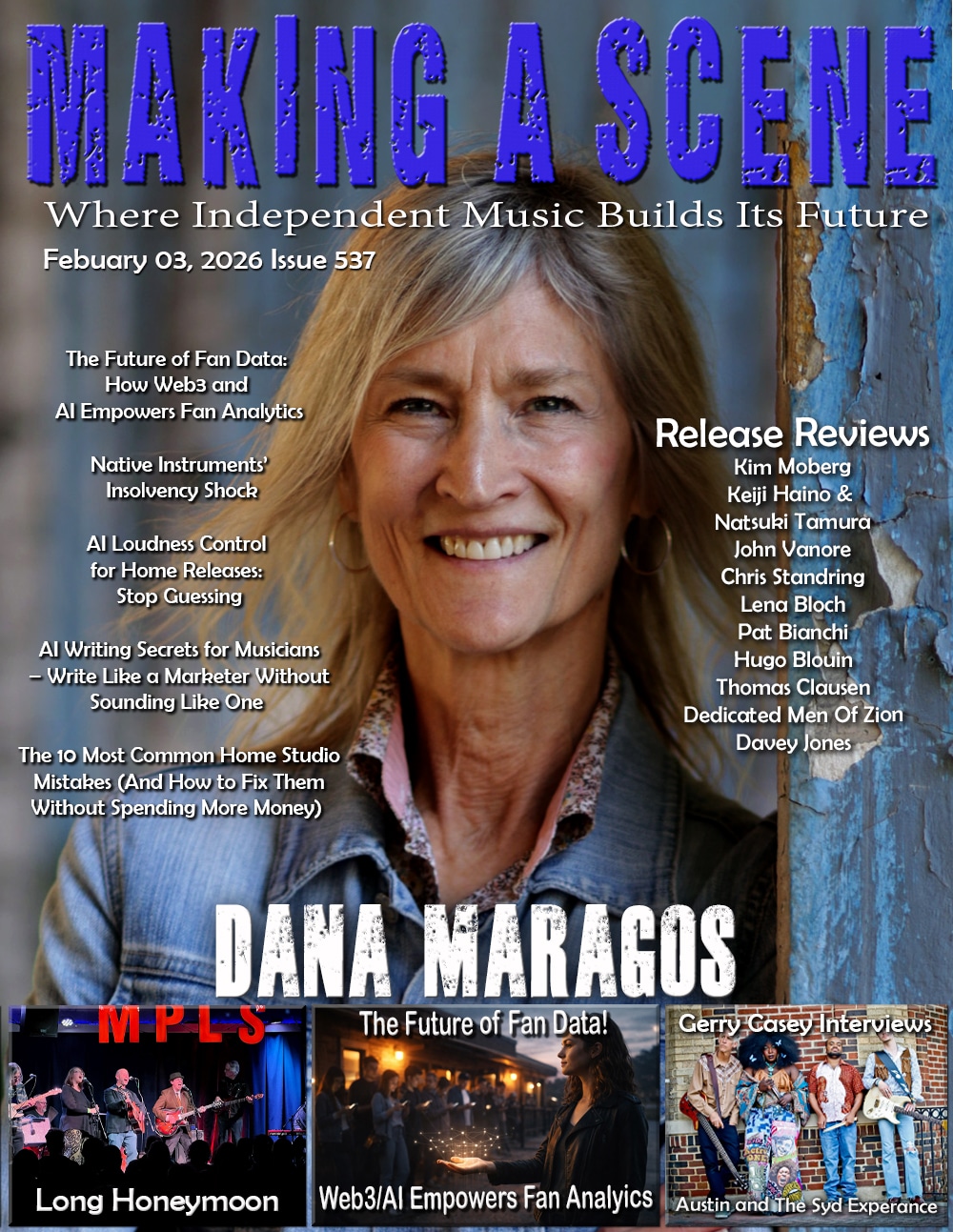Mark Lockheart Smiling
 Mark Lockheart
Mark Lockheart
Smiling
Edition
Saxophonist and composer Mark Lockheart has been on the vanguard of British jazz for four decades now, one surge in the ‘80s and the other here in the 2000s. Yet, his bent for experimentation and genre-agnostic approach would have many considering him an emerging force rather than an elder statesman for the music. Lockheart was a founding member of the groups Loose Tubes and Polar Bear and has been a valued session man for Radiohead and several others. We heard Lockheart on 2022’s Dreamers issued on the this same label. When you review his catalog, you’ll see that he ranges from small combos to larger orchestral settings as on the 30-piece 2019 Days On Earth. This time out, with Smiling, instead of leading a tight quartet, he splits the difference, fronting a 12-piece ensemble with the rhythm mates from the previous endeavor returning, electric bassist Tom Herbert (also with Lockheart in Polar Bear), and drummer Dave Smith (ex-Robert Plant). This is highly textured music, and true to Lockheart’s previous work, cinematic, dramatic, and captivating. He wrote and arranged all eight pieces (with one radio edit).
Billed as in “the grand tradition of the great jazz rock fusions of the ‘70s,” that could be misleading to some. The rock edge is far more subtle than hammer-like, and the range and type of exploratory solos speak as much to contemporary jazz as anything. If you were to find a suitable ‘70s reference point, although this ensemble is larger, it weaves textures and improvises a bit like Herbie Hancock’s Mwandishi. Lockheart shares the wealth, content to be one cog in this giant wheel rather than the overriding dominant force. He’s recruited some great players including flutist Rowland Sutherland, Empirical’s Nathaniel Facey (alto saxophone) joining him as a twin saxophone force, John Parricelli on guitar, and a full brass and woodwind section. Notably there are no keyboards in the ensemble (see below) but Parricelli’s guitar combined with Herbert and Smith makes a driving, formidable rhythm trio.
Full Personnel – Lockheart (tenor and soprano), Facey (alto), George Crowley (clarinet), James Allsop (clarinet and bass clarinet), Laura Jurd (trumpet) (from Dreamers), Mike Sopher (trumpet), Jim Rattigan (French Horn), Anna Drysdale (French horn), Harry Maund (trombone and bass trombone), Sutherland, Parricelli, Herbert, and Smith.
The buoyant “Morning Smiles” sets the tone with Parricelli’ riffing as he joins the bass-drum tandem in a propulsive groove over which Lockheart solos, leaving the spotlight though to both the guitarist and a killer flute turn from Sutherland, who has every bit the flair of an Ian Anderson or Rahsaan Roland Kirk. The brass and woodwind sections thrust expressively in the rhythmically intricate “Back and Forth,” which eventually proves a feature for altoist Facey who soars aggressively above the rich sonic tapestry and pulsating undercurrent. Parricelli sets a rolling, atmospheric groove on “Western Shores” as first we hear Sutherland’s flute before Lockheart carries the theme in his most extensive solo feature on the album.
“Lunch with the Devil” marches along to its start-stop rhythms with prominent bottom contributions from trombone and bass clarinet before the seas part and the tones brighten with emotive statements from clarinetist Crowley and Lockheart on tenor. (As you’re reading this, you may be thinking that you don’t typically see this kind of instrumentation in jazz-fusion, right?). Parricelli’s comping through this is right on target. His is the first voice we hear on the lilting ensemble piece “Wrap Me Up” which could easily vie for a chamber music piece.
The exhilarating “Rapture of the Deep” belongs with a series of fluid clusters from Lockheart, soon joined by Maund and trombone and Rattigan on French horn as they swagger above the thick undercurrent and the swelling ensemble. Tempo recedes for “In Deeper” with the horns delivering short, echoing lines before surrendering to the leader’s searching tenor and Jurd’s probing trumpet in some of the album’s purest jazz moments. The entire ensemble builds to a crescendo, fades, and builds back again for a definitive but far from explosive close. Yet, they fire up with “I’ve Seen the Light,” a stately, swirling, and rollicking tune that finally plays as the danceable jazz-rock fusion for which the album is billed, with Lockheart surfing the wave. Curiously though, (love these unexpected turns from Lockheart) that vibe dissolves in favor of a bass clarinet turn from Allsop in dialogue with Lockheart’s tenor. When the ensemble rejoins, the vibe turns positively raucous, only to end abruptly. The radio edit track is essentials the rousing first three-and-half minutes of the longer version.
As mentioned, the common thread through Lockheart’s music is its dramatic, cinematic quality but Smiling stands light years distant from the indie-pop shades of Dreamers. That’s a testament to Lockheart’s compositional skills.
- Jim Hynes
Buy Us a Cup of Coffee!
Join the movement in supporting Making a Scene, the premier independent resource for both emerging musicians and the dedicated fans who champion them.
We showcase this vibrant community that celebrates the raw talent and creative spirit driving the music industry forward. From insightful articles and in-depth interviews to exclusive content and insider tips, Making a Scene empowers artists to thrive and fans to discover their next favorite sound.
Together, let’s amplify the voices of independent musicians and forge unforgettable connections through the power of music
Make a one-time donation
Make a monthly donation
Make a yearly donation
Buy us a cup of Coffee!
Or enter a custom amount
Your contribution is appreciated.
Your contribution is appreciated.
Your contribution is appreciated.
DonateDonate monthlyDonate yearlyYou can donate directly through Paypal!
Subscribe to Our Newsletter
Order the New Book From Making a Scene
Breaking Chains – Navigating the Decentralized Music Industry
Breaking Chains is a groundbreaking guide for independent musicians ready to take control of their careers in the rapidly evolving world of decentralized music. From blockchain-powered royalties to NFTs, DAOs, and smart contracts, this book breaks down complex Web3 concepts into practical strategies that help artists earn more, connect directly with fans, and retain creative freedom. With real-world examples, platform recommendations, and step-by-step guidance, it empowers musicians to bypass traditional gatekeepers and build sustainable careers on their own terms.
More than just a tech manual, Breaking Chains explores the bigger picture—how decentralization can rebuild the music industry’s middle class, strengthen local economies, and transform fans into stakeholders in an artist’s journey. Whether you’re an emerging musician, a veteran indie artist, or a curious fan of the next music revolution, this book is your roadmap to the future of fair, transparent, and community-driven music.
Get your Limited Edition Signed and Numbered (Only 50 copies Available) Free Shipping Included
Discover more from Making A Scene!
Subscribe to get the latest posts sent to your email.









